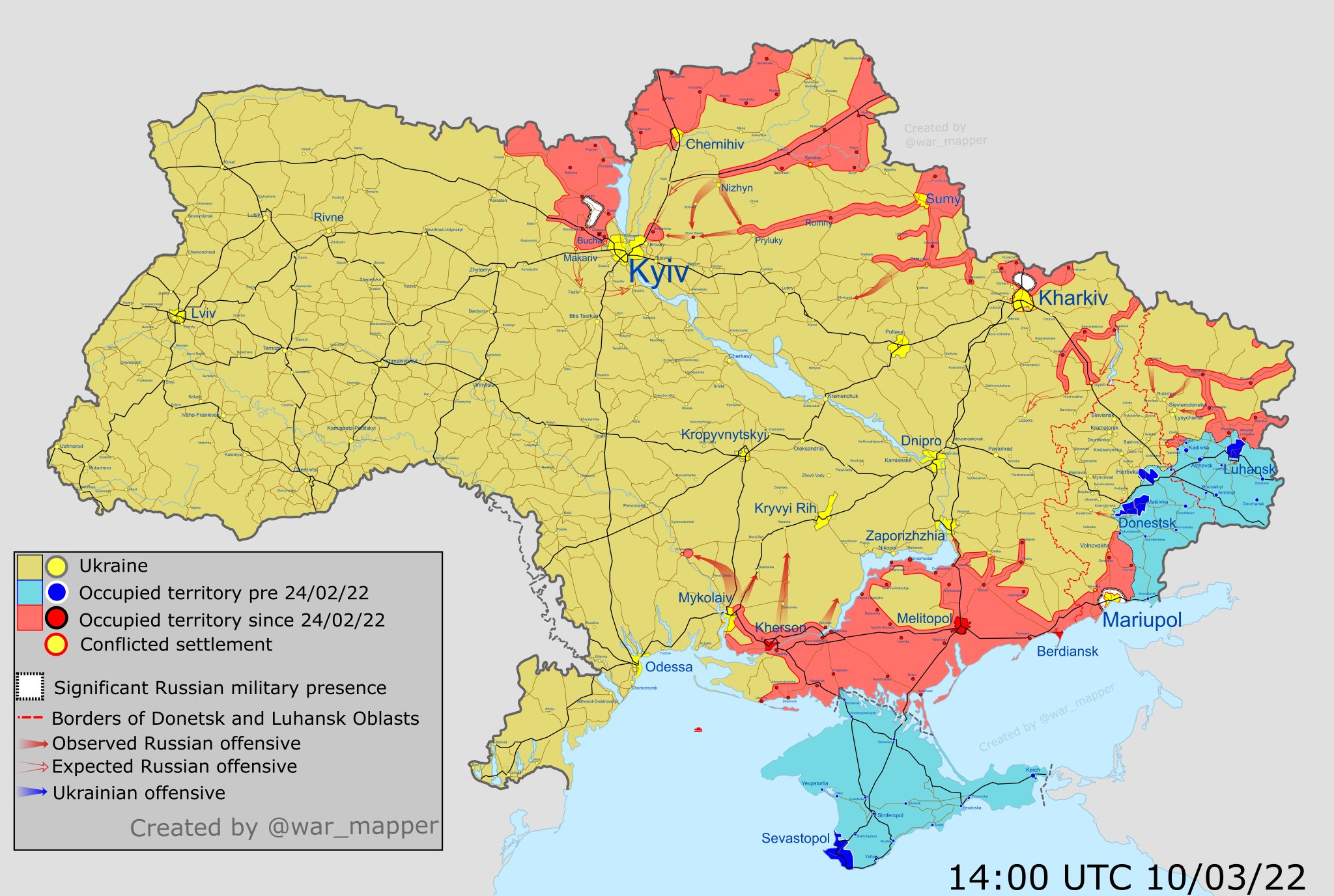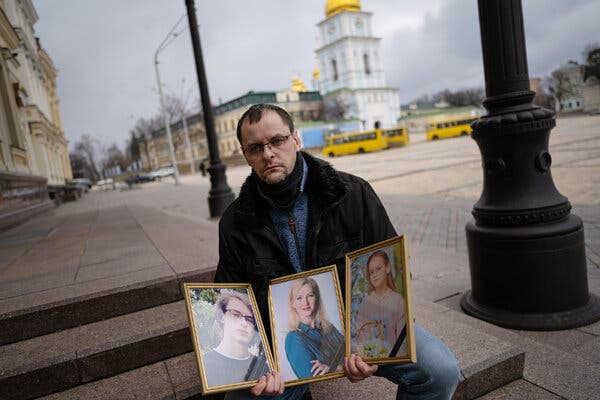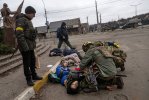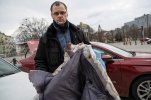Install the app
How to install the app on iOS
Follow along with the video below to see how to install our site as a web app on your home screen.
Note: This feature may not be available in some browsers.
You are using an out of date browser. It may not display this or other websites correctly.
You should upgrade or use an alternative browser.
You should upgrade or use an alternative browser.
Ukrainan konflikti/sota
vompatti
Kenraali
Tätä yksikköä kannattaa ilmeisesti seurata:
Taitaa olla provo

Syväkurkku
Kersantti
https://t.me/voynareal/14200
Venäläinen soittaa äidilleen
Ä: oletko kunnossa
S:enpä sanoisi, kaikki on huonosti
Ä: niin, onko 200(koodi kuolleelle) ja 300(koodi ilm. Haavoittuneelle) paljon?
S: paljon. Paljon. Todella paljon
Ä: 200 myös?
S: joo, paljon
Ä: 200 myös teidän divisioonassa?
S: paljon. Tosi paljon
Ä: siis teidän rykmentissä?
S: rykmentistä ei ole kuin puolet jäljellä
Ä:200:ia niin paljon. Mitä ne mulle sanoi, että tappioita ei ole ollenkaan?
S: paljon tappioita. Tosi paljon
Venäläinen soittaa äidilleen
Ä: oletko kunnossa
S:enpä sanoisi, kaikki on huonosti
Ä: niin, onko 200(koodi kuolleelle) ja 300(koodi ilm. Haavoittuneelle) paljon?
S: paljon. Paljon. Todella paljon
Ä: 200 myös?
S: joo, paljon
Ä: 200 myös teidän divisioonassa?
S: paljon. Tosi paljon
Ä: siis teidän rykmentissä?
S: rykmentistä ei ole kuin puolet jäljellä
Ä:200:ia niin paljon. Mitä ne mulle sanoi, että tappioita ei ole ollenkaan?
S: paljon tappioita. Tosi paljon
Viimeksi muokattu:
Maidan
Respected Leader
On siellä noin 30%, enmmmänkin, järkeviä ihmisiä,mm nuoriso on vahvasti edustettu. Repressio koneisto on nyt huipussa, ja pelottaa monia tosissaan. Mutta totta on, siellä oli näitä ääliö putinin rakastajija, aivottomia homo-sovjetikum edustajija, josta Putte on yksi, se on sellainen sivistymätön aines ja paksukalloisin, jotka aina vihasi kaikkea, mitä poikkesi heidän käsityksistä, ajatuksisista, mutta tilaisuuden tulleen oli valmis vaikka mihin rikokseen. Jännä, että maaseudulla, jossa ihmiset elää raskaampa elämä, hyvin köyhiä, ovat paljon maltillisempia. Eniten kiihkoilevat ne kaupunkien vanhempi ja heitä nuorempi sukupolvi, jotka nenät telkkärissä putinia kuolaten elää ihan sama sovjetti elämä, paitsi hieman kylläisempää, tehnyt näitä lähijoiden ns euro-remontit, jolloin karseat neuvostoasunnot laitettiin hieman tasikkammaksi, ja ne ovat varmoja että se on nimenomaan putten ansiota, eikä yleisen kaikilla maailmalla tapahtuvat kehityksen ja hyvinvointin. Moni heistä ei lukenut mitään kirja. Ja sitten massivinen propaganda koneisto, jonka ylläpidosta Putler@co maksanut miljardin ainakin.Mä en usko nuorison Venäjällä olevan yhtään sen jalompaa ja parempaa kuin muukaan veemäinen venäläinen kansanosa. Pitää muistaa, että Krimin valtauksen jälkeen Putinin kansansuosio oli aivan tapissa ja isovenäläinen uho isoimmillaan. Putinin Yhtenäinen Venäjä -puolue sai v. 2016 vaaleissa talouspakotteista huolimatta 54,2% äänistä. Tuolloin Putinin isovenäläistä politiikkaa tukivat myös Navalnyin kaltaiset, sittemmin Putinia kritisoimaan ryhtyneet oppositiopoliitikot.
ihmisistä tehtyy zombeja propagandalla. Suurin osa on muutenkin ei kyennyt kyseenalaistamaan mitään. Heille on jokasen kuselle haisevalle rappukäytävälle on syyllinen - Amerikka. Jossa ne eivät ikinä käyneet, tuskin tietää mitä ja missä on.
Krimissahan 2014 anneksion aikana kiihkoiltiin eläkkeiden takia. Siellä eläkeläisiä on pilvin pimein. Venäjällä olivat suuremmat eläkkeet, kun Ukrainassa, niin tämä oli edistäjä tekijä. Se oli raivostuttavin asia minusta aina. Maassa joka rikas kun mikä ihmiset elääneet 70 $ eläkkeillä. Kiitos oligharkeille ja varastelevalle Janukovichille. Siksi oli Maidan.
Uskon että Ukrainassa vielä eletään hyvin. Ja Venäjällä ne saa mitä tilasi - Pohjois-Korean.
Kunhan päästävät pois kaikki toisin ajattelijat ja rohkeat nuoret, jotka istuu nyt vankiloissa.
rty19
Greatest Leader
..on siellä Harkovan ympäristössä jotain touhuttu myös tämän Ukraine War Mapin mukaan, mutta ei ole kelpuuttanut hyökkäykseksi;

Olisi täysin oikeudenmukaista tarjota Putinin roistokoplan perheenjäsenille vastavuoroisesti poloniumia ja antaa hitaasti kärsiä
Ainakin se sodan alkupäivinä tielle talojen väliin tuhottu VDV osasto tuhottiin kameroiden avulla. Varmasti paikka oli etukäteen maalitettu, mutta myöhemmin julkaistussa videossa näkyy, kuinka tien vieressä olevan talon ikkunan läpi kuvaavan kameran kääntelyä ja zoomailua ohi kulkevaan osastoon. Välimatkaa ryssien osastoon kameralla alle 10 metriä. Sitten alkaa epäreilu paukkua. Muutaman euron nettikamera, hyvä tuotos per panos suhde. Pun intended.Hyvä kommentti tuossa:
Ilmeisesti tuo on kuitenkin kuvattu vain jollakin tavallisella consumer dronella. On kuitenkin myös jännä aspekti sekin, kun kilometrien päähän voidaan käydä katsomassa livekuvaa tilanteesta jollain muutaman sadan euron kuvaushärvelillä. Sellaista on tämä nykyaika. Tämän lisäksi kiinteitä live-kameroita voi olla missä tahansa.
Eipä pohjoisessa ja idässä Venäjän joukot ole päässeet kovinkaan pitkälle etenemään tässä parin viikon aikana, mutta etelässä näyttää erilaiselta tilanne. Ja nuo pitkät kapeat valloitetut tiepätkät ovat aika haavoittuvaisia, jos sinne saataisiin sinkojen, tarkka-ampujien, jne... kera joukkoja huomaamatta. Ei tarvitsisi kuin muutamia ajoneuvoja sieltä täältä napsia, ja koko kolonnassa olisi sitten useita erilisiä jumiutuneita kohtia...on siellä Harkovan ympäristössä jotain touhuttu myös tämän Ukraine War Mapin mukaan, mutta ei ole kelpuuttanut hyökkäykseksi;

Viimeksi muokattu:
proileri
Kenraali
..on siellä Harkovan ympäristössä jotain touhuttu myös tämän Ukraine War Mapin mukaan, mutta ei ole kelpuuttanut hyökkäykseksi;

Näyttäisi että Khersonin suunnalla on tullut eloa, siellä oli suhteellisen hiljaista viimeisen viikon verran. Ilmeisesti venäläisten hallussa olevia rautatiesiltoja korjattu matkalta ja parantuneet huoltoyhteydet mahdollistavat sen että nyt on alettu taas puskemaan Khersonista pohjoiseen/koilliseen. Näyttäisi että Zaporizhzhian piiritys voisi olla seuraava tavoite.
Ehkäpä on paras olla vajoamatta Venäjän tasolle.Olisi täysin oikeudenmukaista tarjota Putinin roistokoplan perheenjäsenille vastavuoroisesti poloniumia ja antaa hitaasti kärsiä
One of world's deadliest snipers with 3.5km kill distance vows to fight Russians
Wali fought in the Royal Canadian 22nd Regiment, making tours of Afghanistan, Syria, and Iraq.
In June 2017, one of his comrades reportedly shot dead an Islamic State terrorist from an incredible distance of 3,450m - more than two miles away.

One of world's deadliest snipers with 3.5km kill distance vows to fight Russians
Wali, his nickname, has been in Iraq on his own to fight the Islamic State but he has now crossed the border of Ukraine to take on Putin's army after leaving his wife and son in Canada
-
Huom. tämä taisi olla jo täällä, mutta englanninkielistä linkkiä ei osunut silmiin.
Teemupoika
Luutnantti
Arvoisat jäsenet mitä mieltä olette? Venäjän ilmatoiminta Ukrainassa on romahtanut. Suomessa on todettu GPS häirintää! Johtuuko Venäjän ilmatoiminta romahtaminen tuosta häirinnästä? Kun katsoo alasammuttujen venäläiskoneiden navigointilaitteita, niin se perustuu täysin tuohon GPS paikannukseen.
Olenko väärillä jäljillä
Olenko väärillä jäljillä

Syväkurkku
Kersantti
V: täällä huhutaan, että upseerit ei tee muuta kuin ryyppää ja pelaa pleikkaria
S: en tiedä, niin varmaan. Ei niitä ole paljon näkynyt
V: keräävät varmaan sota muistoja itselleen
S: niin kai. Eihän täällä kukaan mieti kuin itseään
V:odotan sinua. Ja kun tulet, pidän sylissä ja ruokin
S: jos olen hengissä. Vielä pari päivää, niin jätän kaiken ja vaikka kävelen kotiin
V:tommosia et puhu. Ne tappaa sut. Sinun komennus loppuu 17. Päivä
S: 17. Päivä olen jo perseessä. Ei täällä kestä niin kauan
V: mutta kyllä ne teidät jo muutama päivä aikaisemmin siirtää pois. Valko-venäjälle tai Kalugaan. Yritä kestää
S: pääsisikin Kalugaan. Saisi ruokaa ja olisi lämmin. Huomenna viimeinen päivä ajoneuvossa. Sitten on pakko yöpyä ulkona
Lukusuositus. Taustat tuo aina sisältöä kohtaloihin tippa tulee silmään.
tippa tulee silmään.
 Copyright NYTIMES verkkojulkaisu / opintomateriaalina reserviläisille https://www.nytimes.com/2022/03/09/...te=1&user_id=2009b901c2f238cbad514d8cd664a4d6
Copyright NYTIMES verkkojulkaisu / opintomateriaalina reserviläisille https://www.nytimes.com/2022/03/09/...te=1&user_id=2009b901c2f238cbad514d8cd664a4d6
They Died by a Bridge in Ukraine. This Is Their Story.
March 9, 2022, 4:50 p.m. ETMarch 9, 2022

Serhiy Perebyinis lost his wife, Tetiana, and both of their children to Russian mortar shelling as they tried to flee Irpin, near Ukraine’s capital, Kyiv.Lynsey Addario for The New York Times
KYIV, Ukraine — They met in high school but became a couple years later, after meeting again on a dance floor at a Ukrainian nightclub. Married in 2001, they lived in a bedroom community outside Kyiv, in an apartment with their two children and their dogs, Benz and Cake. She was an accountant and he was a computer programmer.
Serhiy and Tetiana Perebyinis owned a Chevrolet minivan. They shared a country home with friends, and Ms. Perebyinis was a dedicated gardener and an avid skier. She had just returned from a ski trip to Georgia.
And then, late last month, Russia invaded Ukraine, and the fighting quickly moved toward Kyiv. It wasn’t long before artillery shells were crashing into their neighborhood. One night, a shell hit their building, prompting Ms. Perebyinis and the children to move to the basement. Finally, with her husband away in eastern Ukraine tending to his ailing mother, Ms. Perebyinis decided it was time to take her children and run.
They didn’t make it. Ms. Perebyinis, 43, and her two children, Mykyta, 18, and Alisa, 9, along with a church volunteer who was helping them, Anatoly Berezhnyi, 26, were killed on Sunday as they dashed across the concrete remnants of a damaged bridge in their town of Irpin, trying to evacuate to Kyiv.
Their luggage — a blue roller suitcase, a gray suitcase and some backpacks — was scattered near their bodies, along with a green carrying case for a small dog that was barking.
They were four people among the many who tried to cross that bridge last weekend, but their deaths resonated far beyond their Ukrainian suburb. A photograph of the family and Mr. Berezhnyi lying bloodied and motionless, taken by a New York Times photographer, Lynsey Addario, encapsulates the indiscriminate slaughter by an invading Russian army that has increasingly targeted heavily populated civilian areas.
Ukrainian soldiers trying to save a man — the only one of four at that moment who still had a pulse — moments after being hit by a mortar while trying to flee Irpin, near Kyiv, on Sunday.Lynsey Addario for The New York Times
The family’s lives and their final hours were described in an interview by Mr. Perebyinis and a godmother, Polina Nedava. Mr. Perebyinis, also 43, said he learned of the death of his family on Twitter, from posts by Ukrainians.
Breaking down in tears for the only time in the interview, Mr. Perebyinis said he told his wife the night before she died that he was sorry he wasn’t with her.
“I told her, ‘Forgive me that I couldn’t defend you,’” he said. “I tried to care for one person, and it meant I cannot protect you.”
“She said, ‘Don’t worry, I will get out.’”
After she didn’t, he said he felt it was important that their deaths had been recorded in photographs and video. “The whole world should know what is happening here,” he said.
The Perebyinis family had already been displaced once by war, in 2014, when they were living in Donetsk in the east and Russia fomented a separatist uprising. They moved to Kyiv to escape the fighting and started rebuilding their lives. When Russian tanks rolled into Ukraine last month, they could hardly believe it was happening again, Mr. Perebyinis said.
Tetiana Perebyinis, 43, and her son Mykyta, 18.Serhiy Perebyinis
Alisa Perebyinis, 9.Serhiy Perebyinis
Ms. Perebyinis’ employer, SE Ranking, a software company with offices in California and London, had encouraged employees to leave Ukraine immediately once the fighting started. It had even rented rooms for them in Poland, Mr. Perebyinis said. But his wife delayed her departure because of uncertainty over how to evacuate her mother, who has Alzheimer’s disease.
A colleague at work, Anastasia Avetysian, said that SE Ranking had provided emergency funds for employees to evacuate and that Ms. Perebyinis, as the chief accountant in Ukraine, had been busy in her final days disbursing them.
“We were all in touch with her,” Ms. Avetysian said in a telephone interview. “Even when she was hiding in the basement, she was optimistic and joking in our group chat that the company would now need to do a special operation to get them out, like ‘Saving Private Ryan.’”
But behind the jokes was a period of waiting and intense worrying, Mr. Perebyinis said. His son, Mykyta, started sleeping during the day and staying up all night, keeping a vigil over his mother and sister. When there were sounds of fighting, he woke them up and all three would move into a corridor, away from the windows. “My son was under a lot of stress,” Mr. Perebyinis said.
The family’s apartment building, damaged by Russian shelling earlier this month.Serhiy Perebyinis
Mykyta and Alisa sleeping in the hallway of their home, away from the sounds of fighting.Serhiy Perebyinis
Last Saturday, after two days in the basement, they made a first attempt at evacuating. But as they were packing up their minivan, a tank rolled by on the street outside. They decided to wait.
The next day they were up and moving by about 7 a.m. Tetiana Perebyinis had discussed the plan in minute detail with her husband. She and her two children and her mother and father, who lived nearby, would join a church group and try to evacuate toward Kyiv, and then get somewhere safe from there.
They drove as far as they could in Irpin, but then Ms. Perebyinis was forced to abandon the minivan. They set out on foot toward a damaged bridge over the Irpin River.
To escape, they were forced to cross a hundred yards or so of exposed street on one side of the bridge. As Russian forces fired into the area, many tried to seek cover behind a brick wall.
Mr. Berezhnyis, the church volunteer, who had earlier evacuated his own family but had returned to help others, was with Ms. Perebyinis and her children when they began to dash toward the other side.
Through the night, Mr. Perebyinis had tried to monitor his wife’s location using a locator app on their phones. But it showed nothing: the family was in a basement, without cell reception.

Around dawn, he said, he saw one ping, showing them at their home address. But nothing showed them moving. Cellphone coverage had become too spotty in the town.

The next ping of a location on Mr. Perebyinis’ phone came around 10 Sunday morning. It was at Clinical Hospital No. 7 in Kyiv. Something had gone wrong.He called his wife’s number. It was ringing, but nobody answered. He called his children’s phone numbers, with the same result.
A half-hour or so later, he saw a post on Twitter saying a family had been killed in a mortar strike on the evacuation route out of Irpin. A short time later, another Twitter post appeared, with a picture. “I recognized the luggage and that is how I knew,” he said.
When the mortar shell hit, the family and Mr. Berezhnyi were about 12 yards away from the crater left by the mortar. They had no chance. The explosion sent out a spray of hundreds of jagged, metallic shrapnel shards. Their bodies slumped onto the muddy street beside a monument to World War II dead from Irpin. A plaque on the monument read: “Eternal memory to those who fell for the fatherland in the Great Patriotic War.”
Ms. Perebyinis’s parents were behind the mother and children and were unharmed. They are now staying with Ms. Nedava, the godmother. The following day, a snowstorm blew over Kyiv. The suitcases, one of which had been knocked open by the explosion or later opened by passers-by, lay covered in snow on the street beside blood stains. It held only clothes: a pink child’s tank top, sweatpants, yellow and blue child-size socks, apparently for Alisa.
When asked to describe his wife, Mr. Perebyinis slumped in his chair. Ms. Nedava offered that she had a “light” spirit, was often joking and cheered up a room.
Over their long marriage, Mr. Perebyinis added, “We refurbished three apartments and never argued once.”
Mr. Berezhnyi had moved his wife to western Ukraine but had returned to Irpin to help with the evacuation organized by his church, the Irpin Bible Church, the pastor, Mykola Romaniuk, said in a telephone interview.
When the mortar strike began, with shells landing first a few hundred yards away, Mr. Romaniuk said other church volunteers saw Mr. Berezhnyi run to help Ms. Perebyinis. “He took her suitcase and they started running,” he said.
Mr. Perebyinis with the bloodied and torn clothes of his wife, recovered from the scene where she and their children died.Lynsey Addario for The New York Times
Mr. Berezhnyi, Pastor Romaniuk said, was quiet and generous. “He was the kind of friend who is ready to help with no words needed,” he said. “I do not know how God can forgive such crimes.”
In mid-February, before the war started, Mr. Perebyinis had traveled to his hometown, Donetsk, in rebel-held eastern Ukraine, to care for his mother, who was sick with Covid-19. After hostilities began, the crossing point closed and Mr. Perebyinis was trapped in the East.
To return to Kyiv from separatist-controlled eastern Ukraine after the death of his family, Mr. Perebyinis traveled into Russia and flew to the city of Kaliningrad, to cross a land border into Poland. At the Russia-Poland border, he said, Russian guards questioned him, took his fingerprints and seemed ready to arrest him for unclear reasons, though he was eventually allowed to travel on.
He said he told them: “My whole family died in what you call a special operation and we call a war. You can do what you want with me. I have nothing left to lose.’’
Maria Varenikova contributed reporting from Lviv, Ukraine.

Mr. Perebyinis with the bloodied and torn clothes of his wife, recovered from the scene where she and their children died. (Credit...Lynsey Addario for The New York Times)
Viimeksi muokattu:
Ossikemppainen
Luutnantti
Nyt olisi oiva tilaisuus ratsata Maarianhaminasta Venäjän konsulaatti.Tätä yksikköä kannattaa ilmeisesti seurata:
Oho. Täällähän on demilitarisoidulla alueella komppanian taisteluvarusteet.
Solidsnake
Respected Leader
Jokainen suomalainen on maanpuolustusvelvollinen, laki ei voi estää suorittamasta velvollisuuttaanTätä on joskus mietitty, että mitenkähän Suomi ja lait taikka niiden tulkinnat tällaisessa tilanteessa toimisivat.

herra47
Kersantti
Samaa mietin joskus aikaisemmin kun ekan videon näin. Tulin siihen tulokseen ettäKauheata uhoamista ainakin partasuulta. Varusteetkin vimpan päälle. Mikähän näiden taisteluarvo oikeasti on?
Vatsakkaita karvaisia setä miehiä, vieläkin uskon että verta vuotavat mutta puukko hippaa en haluaisi lähteä leikkimään
